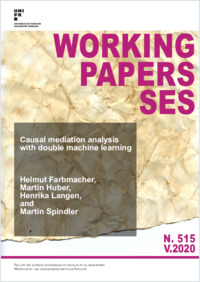Causal mediation analysis with double machine learning
BP2-STS
-
01.05.2020
31 p.
English
This paper combines causal mediation analysis with double machine learning to control for observed confounders in a data-driven way under a selection-on- observables assumption in a high-dimensional setting. We consider the average indirect effect of a binary treatment operating through an intermediate variable (or mediator) on the causal path between the treatment and the outcome, as well as the unmediated direct effect. Estimation is based on efficient score functions, which possess a multiple robustness property w.r.t. misspecifications of the outcome, mediator, and treatment models. This property is key for selecting these models by double machine learning, which is combined with data splitting to prevent overfitting in the estimation of the effects of interest. We demonstrate that the direct and indirect effect estimators are asymptotically normal and root-n consistent under specific regularity conditions and investigate the finite sample properties of the suggested methods in a simulation study when considering lasso as machine learner. We also provide an empirical application to the U.S. National Longitudinal Survey of Youth, assessing the indirect effect of health insurance coverage on general health operating via routine checkups as mediator, as well as the direct effect. We find a moderate short term effect of health insurance coverage on general health which is, however, not mediated by routine checkups.
- Collections
- Faculty
- Faculté des sciences économiques et sociales et du management
- Language
-
- English
- Classification
- Economics
- Other electronic version
- Series statement
-
- Working Papers SES ; 515
- License
-
License undefined
- Identifiers
-
- RERO DOC 328391
- RERO R009039830
- Persistent URL
- https://folia.unifr.ch/unifr/documents/308611
Statistics
Document views: 294
File downloads:
- Document: 446
